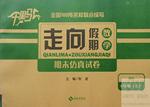题目内容
D
When I was growing up, I was embarrassed to be seen with my father. He was badly crippled (跛脚), and when we would walk together, his hand on my arm for balance, people would stare, I would be ashamed of the unwanted attention. If ever noticed or bothered, he never let on.
It was difficult to walk together—and because of that, we didn’t say much as we went along. But as we started out, he always said, “You set the pace. I will try to follow you.”
Our usual walk was to or from the subway, which was how he got to work. He went to work sick, and even in bad weather. He almost never missed a day, and would make it to the office even if others could not. It was a matter of pride for him.
When snow or ice was on the ground, it was impossible for him to walk, even with help... Such times my sister or I would pull him through the streets of Brooklyn, N.Y., on a child’s sleigh to the subway entrance. Once there, he would try to grasp handrail until he reached the lower steps that the warmer tunnel air kept ice free. In Manhattan the subway station was the basement of his office building, and he would not have to go outside again until we met him in Brooklyn on his way home.
When I think of it now, I am surprised at how much courage it must have taken for a grown man to suffer from shame and disability. And I am also surprised at how he did it—without bitterness or complaint.
He never talked about himself as an object of pity, not did he show any envy of the more fortunate or able. What he looked for in others was a “good heart”, and if he found one, the owner was good enough for him.
Now that I am older, I believe that is a proper standard by which to judge people, even though I still don’t know exactly what a “good heart” is. But I know the times I don’t have one myself.
He has been away for many years now, but I think of him often. I wonder if he sensed my reluctance to be seen with him during our walks. If he did, I am sorry I never told him how sorry I was, how unworthy I was, how I regretted it. I think of him when I complain about my troubles, when I am envious of another’s good fortune, when I don’t have a “good heart”.
17. How did the man treat his father when he was young?
A. He helped his father happily.
B. He never helped his father.
C. He helped his father, but not very happily.
D. He only helped his father take a walk after supper.
18. As a disabled man, his father____.
A. didn’t work very hard
B. didn’t go to work from time to time
C. hated those who had good fortune
D. was happy and satisfied, and never lost hope
19. What does the underlined word “reluctance” mean in the article? It means ____.
A. anger B. sadness C. happiness D. unwillingness
20. How did the father get to work usually?
A. By subway. B. By bus. C. By wheelchair. D. By bike.
【小题1】C
【小题2】D
【小题3】D
【小题4】A

 千里马走向假期期末仿真试卷寒假系列答案
千里马走向假期期末仿真试卷寒假系列答案对话填空 (满分10分)
请认真阅读下列对话,并根据各题所给的首字母的提示,在答题卡右栏中标有题目的横线上,写出一个英语单词的完整、正确的形式,使对话通顺。
| W: Dinner is ready, Frank. M: OK, mum, I’m coming. W: What were you (76) b________ doing? You locked yourself in your room for more than 2 hours. M: I was…Oh, mum, I (77) i________ to tell you after the job interview but I now I’ve changed my (78) m________.I think I should discuss it with you. W: You’ve applied for (79) a________ job? M: Yes, mum, as a computer operator in a large company. W: Good, that’s a job matching your major.Being a salesman doesn’t (80) s________ you at all. M: Yes, (81) b________ I was afraid to tell you because I am not very confident and I don’t want to (82) d________ you. W: Believe yourself, son and relax yourself.(83) O when you’re confident and well prepared, can you (84) m______ them believe you.So you were typing your resume ? M: Yes, mum.Now let’s have dinner and (85) m________ you can give me some instructions about it afterwards. | 76.________________ 77.________________ 78.________________ 79.________________ 80.________________ 81.________________ 82.________________ 83.________________ 84.________________ 85.________________ |